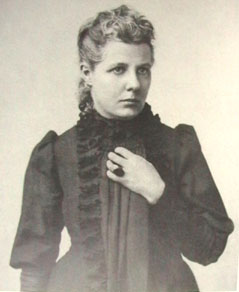Parents with daughters: in such times when our reprehensible media will regularly scrutinise a 5-pound weight loss or gain of any (so-called) ‘celebrity’, is it any wonder there is such a paucity of female role models? We must fight back and educate our daughters about our great ancestral heroines – whose words, deeds and courage are a vital reminder of their revolutionary accomplishments and serve as inspiration for all the work that is still to be done. Today we recall such a heroine – the British women’s rights activist, social reformer and theosophist, Annie Besant – who died aged 85 on this day in 1933.
In the course of a remarkably active career, Besant’s footprints can be found at the forefront of an impressively varied array of significant late-nineteenth and early-twentieth century struggles – beginning as a prominent member of Britain’s trailblazing National Secular Society; as a fervent and (in)famous orator, writer and leading light of the Socialist movement; and culminating in India where she launched the Home Rule League. But what is strikingly constant about Besant, particularly in context with the rigidity of the Victorian era, is the unyielding commitment to her convictions no matter the personal cost: raised a devout Christian, she would come to reject the hypocrisy of church dogma and consequently abandon both her faith and Minister husband; and, as a result of her pioneering crusade for birth control in 1877 (a full four decades before Marie Stopes in England and Margaret Sanger in the U.S.), she would suffer the loss of custody of her two children in a notorious trial that made her a household name. For all her various and varied achievements, Besant is probably best remembered as Madame Blavatsky’s successor as president of the Theosophical Society. I have, however, chosen to briefly highlight one of Annie’s greatest secular victories, for – somewhere in between all of the above – it is often overlooked that she was the driving force behind a strike that forever changed the labour movement in England…
The Bryant and May match factory in East London employed some 1,400 workers, mainly young girls under the age of 15. The girls worked for up to thirteen hours a day for a “white slave” wage of less than five shillings a week, but their most serious concern was the grisly industrial disease known as “phossy jaw” – the poisonous phosphorus used in the matches caused a disfiguring and deadly facial bone cancer. Annie Besant not only exposed the horrific conditions inside the factory through her writing and oratory, but went on to organise the girls and lead them in a strike. The courage of these young girls was all the more remarkable because this was the first such action in England by unskilled workers. After three weeks of pressure, for which the girls received national publicity and support (again, another first for the working underclass), Bryant and May announced that it would meet the strikers’ terms – one of which was the right to form a trade union, to which the girls elected Annie Besant as their honorary president.
History has incorrectly credited the London Dock Strike of 1889 as the turning point in British trade unionism, but it was in fact The London Matchgirls Strike of 1888 which the dockers used as their blueprint. This milestone in the British labour movement, resulting in the unionisation of casual, unskilled an poorly-paid workers all over the country, was in no small part thanks to the efforts of Annie Besant.



8 Responses to 20th September 1933 – the Death of Annie Besant